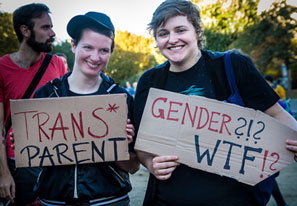
Another day in academia, another twist in the bizarre world of identity studies. The Center for the Study of Sexual Culture at the University of California, Berkeley, is presenting a talk next week on “Queering Agriculture,” dedicated to the proposition that “it is absolutely crucial queer and transgender studies begin to deal more seriously with the subject of agriculture.”
Queer theory has taken over student life on many campuses. Now that gay identity has been thoroughly institutionalized, declaring oneself “trans*,” “genderqueer,” “pangender,” or any of the other rapidly multiplying alternative sexes has become the last frontier of self-engrossed agitation available to students. But apart from the odoriferous leavings of female ginko trees, the “problem” of gender and plants did not seem to be a pressing one, making the application of queer theory to agriculture an innovation that even the most dogged observers of identity studies might not have seen coming. The talk’s presenter, a Ph.D. candidate in American studies at the University of Maryland, will allegedly show that “the growing popularity of sustainable food is laden with anthroheterocentric assumptions of the ‘good life’ coupled with idealized images and ideas of the American farm, and gender, radicalized and normative standards of health, family, and nation.”
Is it possible that beneath this stale rhetoric of High Theory lies a healthy skepticism toward the hypocrisies of modern environmentalism? Perhaps, but it is as likely that the lecture will simply impose the jargon of queer studies onto a pseudo-Marxist critique of agriculture and a debunking caricature of the traditional family. Presenter Bailey Kier is a typical product of the modern-day humanities department: he (if that is an acceptable term) has spent so much time researching “queer ecologies” that he appears to have largely missed out on grammar and style. The lecture description is pervaded by such infelicities of language as “the manipulation of reproduction and sexuality are a foundation of agriculture.” No one at the Center for the Study of Sexual Culture noticed these errors, either, because immersion in High Theory has crowded out exposure to the normal workings of the English language.
“Queering Agriculture” looks rigorously empirical, however, compared with other lectures sponsored by the Center for the Study of Sexual Culture. Next month, an assistant professor of women’s and gender studies at Rutgers University will be presenting on “Race, Sexuality and Affective Heredity before the Gene.” The prospectus explains:
Theorizing “impressibility” as a nineteenth-century keyword linking race and sexuality, the talk explores how scientists, reformers, and writers alike saw themselves as working in concert with a neurobiological substrate that they conceived of as, in its ideal form, fluid, malleable, and forever in dynamic exchange with surrounding bodies, objects, and forces. . . . The talk’s investigation of the pre-determinist materiality of the body provides an important perspective on the biopolitics of affect and the stakes of feminist materialisms.
People outside the academy still do not grasp that such discourse doesn’t represent some eccentric backwater within the university—it lies at the very core of today’s humanities. It’s the serious, selfless study of human creation that is now at the margins, fighting for survival. And the identity-studies worldview doesn’t stay put.
New York’s leftist mayor, the supremely self-confident Bill de Blasio, has of late been promoting his agenda for eradicating economic inequality—a mission he believes to be fully in line with his powers as mayor. Compared with such academic irrelevancies as “feminist materialisms,” de Blasio’s predictable list of income-redistributing and market–manipulating measures seems almost refreshingly down-to-earth. But in fact, de Blasio’s political world is intimately related to the academic hothouse. His ongoing argument that the police are the greatest threat facing young black males today is of a piece with academic racial victimology; it’s a virtual certainty that his administration is rife with gender-studies and critical-race theory graduates.
The current political debate about how to make college more affordable proceeds in blind ignorance of the actual content of college courses. University presidents are expert at presenting a reassuring, normal face to the outside world, pretending that their institutions are all about practical knowledge creation and the elevation of students’ future earnings (the latter function an improper goal for the university in any case). What needs to be understood is that the people running the humanities today are no longer the guardians of our culture, but its nemesis.